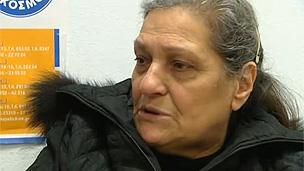Greece's poor queue for food aid in Athens
- Published

The economic crisis in Greece has seen the numbers of unemployed and homeless grow week by week, leaving many Greeks deeply pessimistic about the future.
It is not surprising to see handouts in the Middle East, or Africa or the Caribbean. But food aid, in a western European capital?
This was Athens, this month, and there were plenty of people queuing up for the free tins of beans and packets of soup.
Among them was a pharmacist - Sotires Triantafillou - who looked as if he was in his early 30s. A well-turned-out and serious man, with short dark hair.
He had had eight years of continuous employment until two months ago when the Greek economic crisis finally forced him from his job.
His seven-year-old daughter had kept the family up all night with an illness. He had come for some medicine for her and left with it in a rustling plastic bag, a box of food supplies under his arm.
"There are no jobs out there. It's my only way of getting by," he told me, sadly.
Benefits cuts
A child cried briefly. But mostly the people around us muttered quietly, waiting their turn under fluorescent strip lights.

Dimitra Koulizou's pension could be reduced by up to 20%
A chilly, late-winter breeze blew in through the door from the street as another person stepped inside.
We were in a clinic, in a poor suburb of the Greek capital.
Vaccinations were being given to some of the children. In an office, another was getting a free check-up from a volunteer doctor who had just come off shift at the nearby hospital.
A nurse came out into the corridor with a face mask on and called out someone's name.
A woman stepped forward and held out her arms - another box of food.
Dimitra Koulizou was sitting patiently, waiting her turn beneath one of the charity's posters. It showed a malnourished child from a far less developed country, staring into the camera.
Dimitra is a pensioner and she cannot afford the costs in even the public healthcare system.
Her story was typical. Up until now, she has received 600 euros (£502; $792) a month from the government. It supports her, her son - who cannot find work - and his family. They are no longer entitled to benefits.
This month though the government has announced pension cuts of up to 20% - possibly 120 euros a month less for Dimitra and her dependents.
"It's not right," she told me.
If her income falls that much, it will be even harder for her to support her family. And this is the fear that hangs over many here.
Anxiety
While it is estimated that a third of Greeks now live below the poverty line, most do not live at the extreme end.
Most are not homeless, out on the street. Most indeed do not need food aid. Yet almost everyone knows someone who has lost their job, or had their wages or benefits cut.
And the traditional networks that provided a natural safety net are fraying.
Once, if one son or daughter lost their job, the family would rally round, help them out, support them. But when two or three children have no income, when the pension and unemployment benefits are slashed as well - what then?
It is this that is most alarming about Greece.
The capacity of the population to cope is being eroded - almost every day, it seems. For some, it is a matter of being unable any longer to afford organic fruit and vegetables.
For others it is far, far more serious. But for almost everyone, there is a sense of unease, of anxiety about the future and how to survive it.
It is this that does not show up in the spreadsheets of the bureaucrats in Brussels, in the charts of the European Central Bank, in the sums of the International Monetary Fund.
You do not measure a people's ability to survive in percentages of Gross Domestic Product.
Perhaps Greece is finally on a secure path to financial stability - though I doubt it.
But even if it is, there are many, many more who will be heading to the clinic to get their food aid before this is over.
How to listen to From Our Own Correspondent:
BBC Radio 4:A 30-minute programme on Saturdays, 11:30 GMT.
Second 30-minute programme on Thursdays, 11:00 GMT (some weeks only).
Listen onlineordownload the podcast
BBC World Service:
Hear daily 10-minute editions Monday to Friday, repeated through the day, also available tolisten online.
Read more orexplore the archive, externalat theprogramme website, external.
- Published11 March 2012
- Published9 March 2012